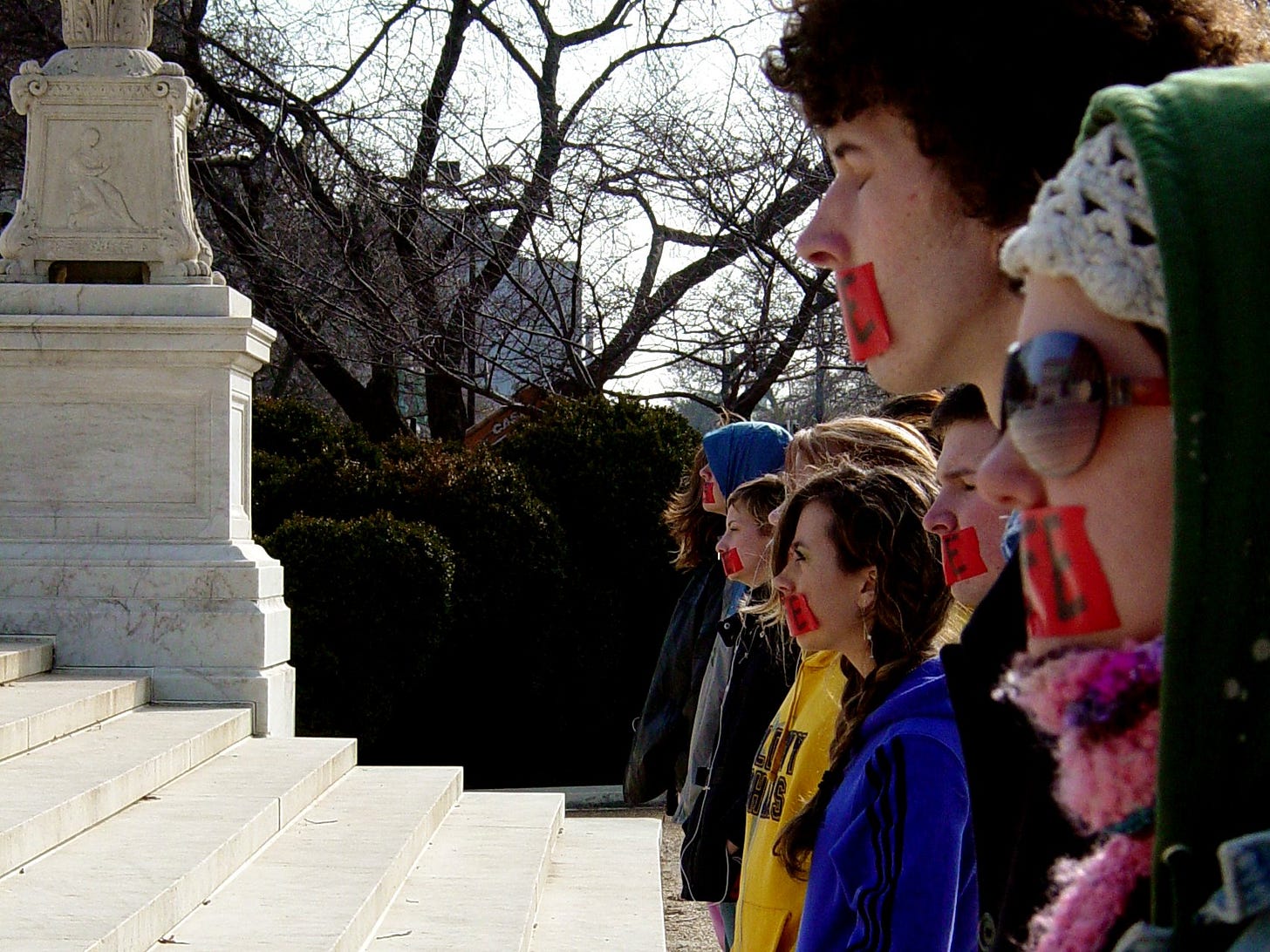Message to abortion foes: you're not popular
BONUS: The Chris Sununu-Charlie Baker character contrast

As regular readers of this newsletter are probably aware, I’ve long been fascinated by the intersection of politics and popular culture. And try as I might, I can find no topic more fascinating than abortion.
Hardliners on both sides have dug in their heels and are convinced of the righteousness of their cause. But truth be told, most Americans are somewhere in the middle on this issue. Even the most ardent abortion opponents allow for an exception to save the life of the mother and, often, in the case of rape and incest as well.
The latter two exceptions have often struck me as hypocritical. After all, the argument against abortion rests on the logic that the unborn child is an innocent victim. But how is an unborn child conceived as a result of rape or incest any less an innocent victim than a child conceived through consensual sex — or marital sex, for that matter? It’s not, of course, which is why I’ve often viewed the exceptions offered by pro-lifers to be more political than anything else. They’re little more than an attempt to appear “reasonable” to others.

Likewise, qualified supporters of abortion rights (myself among them) become increasingly uncomfortable with the concept of terminating a pregnancy heading into the last trimester. But according to a Pew study released about three weeks ago, 93% of abortions in the United States occur in the first trimester (or before 13 weeks). Only about 1% were performed at 21 weeks or more of gestation, which is when the third trimester begins. So our objections are to a tiny percentage of the abortions performed.
And that tiny percentage is what went unprotected by Roe vs. Wade, the 1973 Supreme Court decision that gave states the right to regulate abortion only from the point of viability, which is right around the third trimester. So as a practical matter, I liked the result of the Roe decision, though I agree with those who think the court’s reasoning that abortion should be protected by the 14th Amendment’s “right to privacy” was flimsy at best.
The anti-abortion and pro-abortion rights advocates (I refuse to use the marketing terms “pro-life” and “pro-choice”) have been fighting with renewed intensity for nearly two years after a conservative SCOTUS effectively overturned Roe. Since then, half the states have enacted bans in one form or another — or plan to. Here is a handy interactive map from the Guttmacher Institute, updated weekly by state, along with a recent screenshot below:
On the national level, Republicans have historically favored significant restrictions on abortions. Indeed, for the last 40 years, overturning Roe was the holy grail of their political zeitgeist. But now that they’ve achieved it, Republicans are doing their best imitation of the dog that caught the car. To extend this hackneyed metaphor, they’ve stopped the abortion train in its tracks, but now what do they do?
It turns out that restricting abortion rights is very unpopular in this country. For reasons that escape me, Republicans did not understand this. After all, governments, both local and national, have historically been in the business of expanding rights, not taking them away. Well duh …
Now we shift to the presidential election. Given recent polling results, you’d have to consider Donald Trump to be the favorite over the current president. But if 81-year-old Joe Biden manages to hold on to power for another four years come November, you’d have to think his party’s staunchly pro-abortion rights position will be a key factor.
And along came two polls last week that appear to confirm this:
A recent Wall Street Journal poll (free link) of seven battleground states found that 39% of suburban women cite abortion as a make-or-break issue for their vote—making it by far the most motivating issue for the group. Nearly three-quarters of them say the procedure should be legal all or most of the time, and a majority thinks Trump’s policies are too restrictive.
Trump, who I’m sure doesn’t give a rat’s ass about abortion himself, is clearly struggling to find a position that will be acceptable to enough voters to put him back in the White House (and potentially keep him out of jail). So he simultaneously congratulates himself for overturning Roe but then says any restrictions on abortions should be left to the states. Huh? If you honestly believe abortion is the intentional taking of a human life, why wouldn’t you want a national ban? Obviously, Trump doesn’t believe in the cause but, for obvious reasons, he’s striking a pose and hoping for the best.
To the surprise of even yours truly, the right to an abortion has prevailed in the seven states where it’s been tested since June 24, 2022, when Roe was overturned. These include even conservative states such as Kansas, Kentucky and Montana. In Arizona, which has a Democratic governor who won by a slim margin in 2022 and where both houses of the state legislature are narrowly GOP-controlled, a battle has broken out between the Arizona House and Senate over whether to repeal the state’s near-total ban on abortion based on a law enacted in 1864 and recently reinstated by the state Supreme Court.
Even Republican Kari Lake, the Trump-endorsed, batshit crazy former local television news anchor running for US Senate, has backed away from the 160-year-old ban after calling it “a great law” during her failed gubernatorial campaign in 2022. Like John Kerry 20 years earlier, she was “for it before she was against it.” And after saying abortion law should be left to the states, Trump called on state lawmakers to repeal the pre-historic Arizona ban. What?
The Biden campaign seized on the Arizona court ruling, which seemed preposterous on its face, based as it was on a law enacted while Abraham Lincoln was still president and Arizona wasn’t even a state. Vice President Kamala Harris called it “an inflection point.” No kidding.
Turns out there are also a lot of conservatives who don’t want the government to tell women what to do with their bodies. Historically, they just haven’t made as much noise about it as their liberal counterparts.
Then earlier this week, the results of a presidential poll conducted by Siena College and the New York Times were released. The new survey shows Biden making substantial progress in closing the gap between him and Trump, who now leads Biden by the slimmest of margins, 46-45 percent, well within the margin of error of 3.3 percent. In February, Trump led 48-43 in the same poll.
The poll also touched on the issue of age. As the New York Times put it (free link):
A full 69 percent of voters still see the 81-year-old Democrat as too old to be an effective president. Mr. Trump, who turns 78 in June, would also be the oldest president in American history if elected. But voters do not have the same doubts about his capacity to serve, with only 41 percent viewing him as too old.
As the old saying goes, correlation is not causation. But it’s reasonable to conclude that pushback on the abortion rights issue was a substantial factor in the polling movement. Moreover, the economy hasn’t really improved since February and Biden hasn’t gotten any younger.
Sununu: Career over self-respect
Before I sign off, you’ve got to see this interview George Stephanopoulos did on Sunday with New Hampshire Gov. Chris Sununu, who repeatedly denounced Donald Trump during the GOP primary campaign while he was supporting the candidacy of Nikki Haley.
Sununu had said previously that Trump should drop out of the presidential race if he’s convicted of any of the dozens of criminal charges he faces and that “President Trump’s rhetoric and actions contributed to the (Jan. 6) insurrection."
Now Sununu basically says “Never mind.” It was just campaign rhetoric. I’ve often wondered what it is about the nature of politics that causes elected officials to humiliate themselves. I used to like Sununu, but if he doesn’t respect himself, how can I respect him?
It’s worth noting that a fellow GOP governor from a neighboring state, Charlie Baker of Massachusetts, made a very different choice. Like Sununu, he was faced with the choice of embracing Trump and having a future in the Republican Party, or refusing and doing something else. Baker left office with high popularity and became president of the NCAA. Sununu finds politics so intoxicating that he would sooner make an ass of himself than leave the spotlight. How sad …




